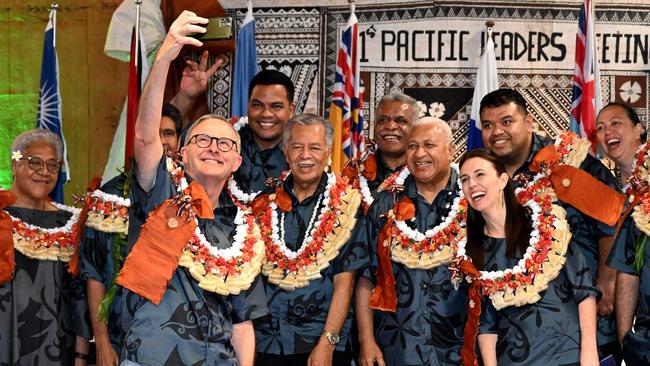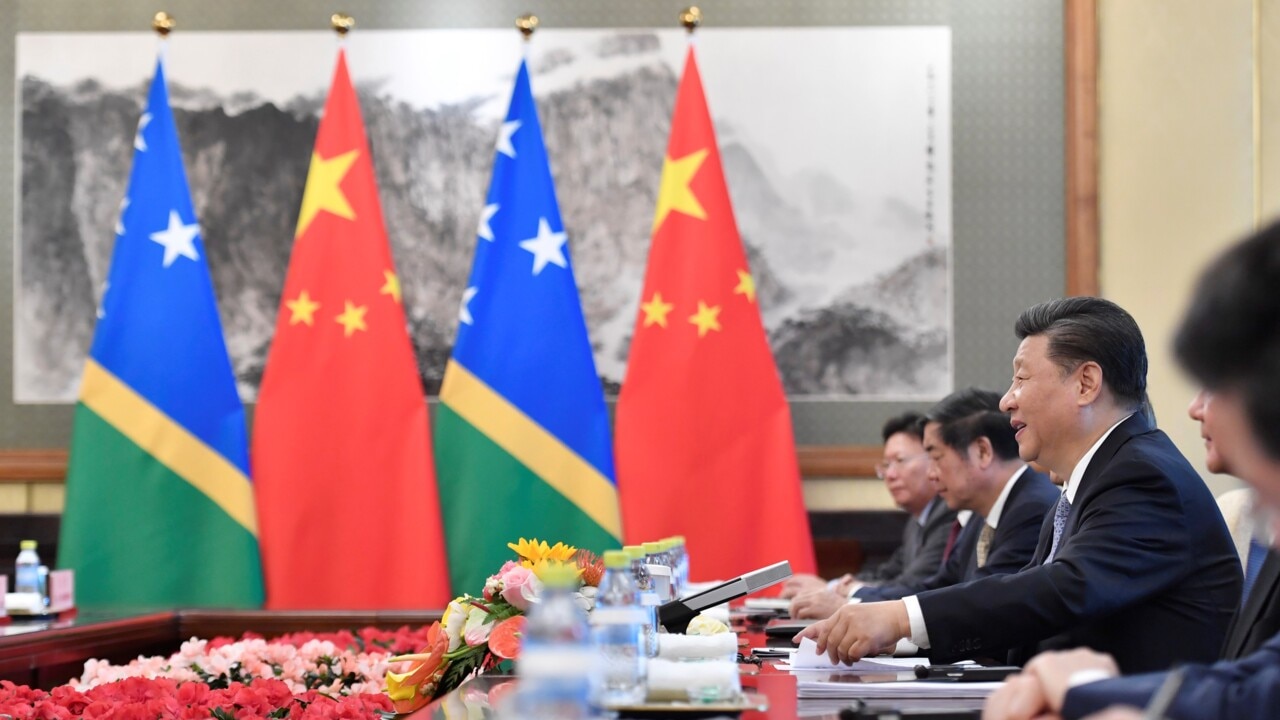Manasseh Sogavare rules out a Chinese Solomons base
Pacific leaders have pressed Anthony Albanese to cut emissions more deeply saying their way of life was threatened by a global ‘climate emergency’.

Pacific leaders have pressed Anthony Albanese to cut emissions more deeply, despite unanimously endorsing his 43 per cent reduction target, saying their way of life was threatened by a global “climate emergency”.
Speaking at the end of the Pacific Islands Forum in Suva, the Prime Minister argued that his recalibration of climate policy had facilitated a reset in relations, including with Solomon Islands leader Manasseh Sogavare who had raised security concerns in Canberra after clinching a security agreement with Beijing in April.
Mr Albanese said he took assurances from Mr Sogavare that there would be no Chinese base in Solomon Islands “at face value” and he was seeking to reconfirm Australia’s position in the region as the “security partner of choice”.
“I welcome his comments in ruling out there being a Chinese base,” he said.
“We are now very much re-engaged with the Pacific.”
“I note that previously this meeting would have still been going for many hours. I’m told that one of the reasons for that is the changed position of Australia (on climate change).”
“Australia’s new position on climate change was particularly well-received, and that is reflected in the communique.”
Mr Albanese welcomed the unveiling of a new strategic plan aimed at preserving unity in the Pacific out to 2050, given greater strategic competition in the region from the US and China. It called for a “flexible and responsive regional security mechanism” to address traditional and non-traditional security issues.
He said it was also important to preserve unity in the PIF, noting there had been divisions that were still being addressed through the Suva Agreement aimed at bringing nations together and that Kiribati – which did not attend the forum – had expressed an interest in resuming dialogue.
“The leader of Kiribati called (Fijian) Prime Minister (Frank) Bainimarama and indicated to him that he wanted to have dialogue and the door is open for them to rejoin the Pacific Islands Forum,” Mr Albanese said.

The draft communique released after the 51st PIF warned climate change posed a threat to the livelihoods, security and wellbeing of the people of the Pacific.
“Leaders declared that the Pacific is facing a climate emergency,” the communique said. It said Pacific leaders “urged world leaders, especially the big emitters, to recognise climate change as the single greatest threat to the planet” and to achieve net zero emissions by 2050.
Mr Albanese said the use of the term “climate emergency” was not new but represented a “jobs opportunity for Australia” that could help turn the nation into a renewable energy superpower.
He also revealed that no Pacific leader had asked him to commit to stopping new coal or gas projects.
However, the communique said Pacific nations would work together to ensure the next climate change conference in Egypt delivered “an ambitious outcome that reflects the need to urgently scale up ambition”.
Developed nations were urged to “at least double their collective provision of climate finance for adaptation to developing country parties from 2019 levels by 2025.”
Mr Albanese’s 2030 emissions reduction target of 43 per cent on 2005 levels was welcomed, as well as the Prime Minister’s interest in hosting a climate summit on Australian soil. “Leaders welcomed and fully supported Australia’s renewed commitment to the Forum’s climate change priorities (and) also welcomed the interest from Australia to host a UN Framework Convention on Climate Change Conference of Parties in partnership with Pacific Island countries,” the communique said.
Individual Pacific nation leaders still used the PIF as an opportunity to call on Mr Albanese to go further in reducing emissions to help limit global temperature increases to 1.5C.
The new 2050 strategy provided a blueprint for advancing Pacific regionalism for the next three decades.








To join the conversation, please log in. Don't have an account? Register
Join the conversation, you are commenting as Logout